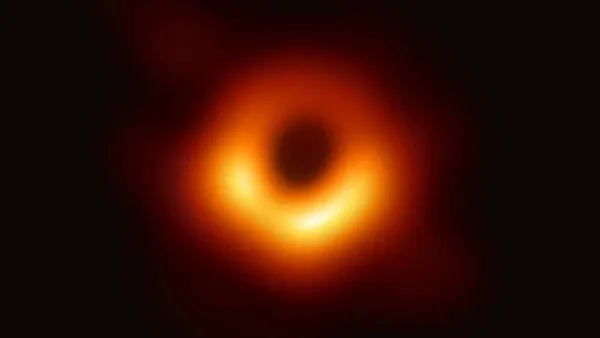Eye For Film >> Movies >> Black Holes: The Edge Of All We Know (2020) Film Review
Black Holes: The Edge Of All We Know
Reviewed by: Jennie Kermode

In 2019, the eyes of the world looked upon an image of a black hole for the first time: Sagittarius A*, at the centre of our own galaxy. The public seemed most impressed by its resemblance to the Eye of Sauron in Peter Jackson's Lord Of The Rings films, but then, few people had any inkling of how much work had been involved in capturing it. This film looks at what went on behind the scenes as giant telescopes across the world were synchronised to work like a single Earth-sized one, and at the vast quantity of data that had to be processed afterwards. It also meets teams working on the physics of black holes and pushing the limits of our understanding regarding how they function and what they can tell us about the universe.
Included here is some of the last footage of Stephen Hawking at work prior to this death in 2018. We see him and four friends, some of the smartest and more highly skilled physicists in the world, on a weekend away in a country house where they can brainstorm over difficult equations all day and enjoy the fresh air. It's an interesting reminder for the public that scientists are human and can enjoy social opportunities as much as anyone else, and it also hints at the loneliness that might stem from having only a handful of people in the world who can understand when one wants to talk about what one does at work.

The puzzles that these scientists are working on are not sufficiently well set out in the film to let viewers play around with them (and it would be impossible to investigate solutions anyway without a lot more data than there's room to explicate here) but we do get a sense of the type of problem that the scientists are grappling with and, perhaps more importantly, of the impact that the experience is having on them emotionally. The experience is akin to that of watching a great artist at work and not being able to match their vision but observing their process. There's no patronising nonsense about boffins and no sniping at experts; neither is there the awkward adulation that sometimes creeps into films of this type; just a healthy respect and an opportunity to forge a human connection.
Perhaps the most striking member of this group is Sasha Haco, who is only in her thirties. It's quite a thing to see someone who has progressed to the top of such a complex field so early in life. When we meet the group working on the Sagittarius A* data, we see much younger scientists, presumable PhD students. This material will be inspirational for younger viewers thinking about careers in the field. They're working under supervision, of course, but this is not one of those disciplines in which junior members have no opportunity to share their ideas. Suggestions fly back and forth as they try to iron out problems and, beyond creating an image, begin to unravel what their data actually means.
This is, as the title suggests, about working at the very edge of human knowledge. Until a few years ago, we didn't even know that it was possible to access some of the data beginning to emerge now. There are difficulties with scale, however. This area of physics could lead to the development of truly radical new technologies, but politicians aren't good at coping with radical ideas. The concept involved are simply too big for most of them, so the field remains underfunded. The people who could reshape our future as a species sit around formica-topped tabled in tiny rooms and everything runs more slowly than it should.
This isn't easy material for cinema to reckon with. The drab locations (that country house excepted) and the plethora of written equations don't look great onscreen. Director Peter Galison focuses on capturing facial expressions, often catching his subjects off guard, and on letting us see the import of what's going on through their reactions. A smattering of outdoor telescope shots reminds us that horizons are being crossed. The resulting documentary doesn't score on all levels, but it's a bold attempt to help important work reach a wider audience, and it's a valuable contribution to recorded history.
Reviewed on: 02 Mar 2021


















